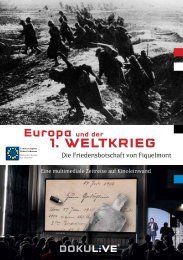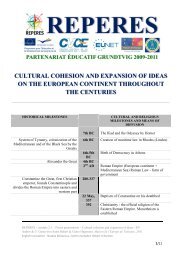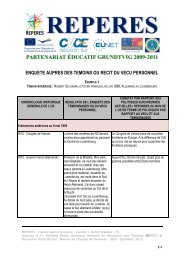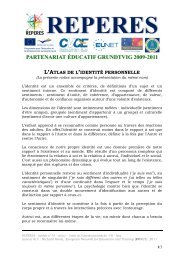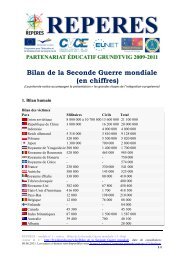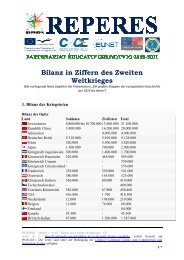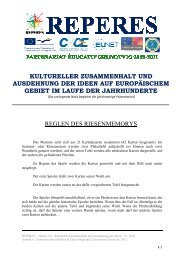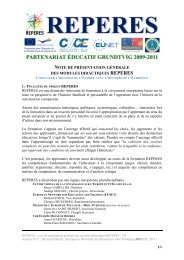METHODOLOGICAL NOTES PEDAGOGY â DIDACTICS ...
METHODOLOGICAL NOTES PEDAGOGY â DIDACTICS ...
METHODOLOGICAL NOTES PEDAGOGY â DIDACTICS ...
You also want an ePaper? Increase the reach of your titles
YUMPU automatically turns print PDFs into web optimized ePapers that Google loves.
<strong>METHODOLOGICAL</strong> <strong>NOTES</strong><br />
<strong>PEDAGOGY</strong> — <strong>DIDACTICS</strong> — LEARNING<br />
UNITE THE HISTORY OF EUROPE WITH THE HISTORY OF THE EUROPEAN<br />
1.- PEDAGOGICAL TRIANGLE OF THE PROJECT REPERES<br />
There exist complex interactions between the three angles of the triangle<br />
representing the learning situation. The role of the pedagogy to be applied is<br />
to master them as well as to predict and regulate them in order to make the<br />
learning process as efficient as possible. It is a delicate balance to achieve<br />
and should always be adapted to learners, goals, contents and situations.<br />
Knowledge<br />
Pedagogical relationship<br />
Teacher<br />
Learner<br />
8<br />
Every axe of the triangle is essential. However, each can work only in<br />
connection with the other or it would lead into inefficient situations (major<br />
risk of the project REPERES) or situations unrelated to pedagogical action.<br />
REPERES – methodological notes 2 methodological notes pedagogy — didactics — learning– EN<br />
Author & © : Richard Stock, European Network for Education and Training (EUNET), 2011<br />
English translation: Natalia Belzarova, Centre européen Robert Schuman<br />
1/5
2.- DIDACTIC CONCEPTION OF THE PROJECT REPERES<br />
The project REPERES consists in transmitting the knowledge (general<br />
history of European integration and memories of the societies), in teaching<br />
or developing the adaptation know-how and in individualizing cognitive<br />
behaviour skills.<br />
2.1.- Application of new practices in learning process:<br />
1. Learn in a different and autonomous way ;<br />
2. Diversify sources, develop a critical approach ;<br />
3. Produce in order to learn ;<br />
4. Debate in order to confirm the knowledge, in other words, argue and<br />
refuse the common sense ;<br />
5. Give knowledge a sense by using social and cultural behaviour skills ;<br />
6. Encourage team working.<br />
When we talk about competence in the project REPERES, we refer to the<br />
one’s possibility to mobilise in an interiorised way a set of resources for the<br />
purpose of solving a group of situations-problems related to the history of<br />
European integration, splitting this competence into:<br />
A. know-how to mobilise personal real-life experiences or testimonies ;<br />
B. know-how to include the results from a personal research into the<br />
general history of European integration ;<br />
C. know-how to transfer the personal results to other learners.<br />
REPERES – methodological notes 2 methodological notes pedagogy — didactics — learning– EN<br />
Author & © : Richard Stock, European Network for Education and Training (EUNET), 2011<br />
English translation: Natalia Belzarova, Centre européen Robert Schuman<br />
2/5
2.2.- Frame of reference of abilities and competence to be learnt<br />
Abilities Competence Goals<br />
Know important milestones in<br />
Date events<br />
the history of European<br />
integration<br />
Set, place oneself in time<br />
Place events<br />
Comprehend different durations<br />
Identify stages of an evolution<br />
Place simultaneous events<br />
Calculate duration: years,<br />
decades, etc.<br />
Identify key dates<br />
Locate, place oneself in space<br />
Acquire a method of collecting<br />
personal life experiences or<br />
testimonies<br />
Process data<br />
Get one’s bearings<br />
Use scales<br />
Locate geographical blocs<br />
Understand the crucial role of<br />
interviews<br />
Acquire a common language<br />
Choose interlocutors to collect<br />
information<br />
Define the area/perimeter of<br />
interviews: auto description or<br />
interview?<br />
List good questions to ask<br />
oneself before the approach :<br />
know the key elements of a<br />
historical description<br />
Set up relationships<br />
Generalise<br />
Draw up a synthesis<br />
Know and use the compass<br />
rose, bearings and geographical<br />
coordinates<br />
Calculate a distance with a<br />
graphical scale ; locate the<br />
same space on the maps with<br />
different scales<br />
Locate states, regions, cities,<br />
rivers, etc.<br />
Acquire the know-how to<br />
conduct an interview in order to<br />
collect information<br />
Set up a guide to conduct an<br />
interview; know how to ask the<br />
right questions.<br />
Practise conducting interviews<br />
Set up the causal relationship<br />
Transpose a particular case into<br />
more general context<br />
Identify the main topic of a<br />
document<br />
Respect the terms of<br />
confidentiality<br />
REPERES – methodological notes 2 methodological notes pedagogy — didactics — learning– EN<br />
Author & © : Richard Stock, European Network for Education and Training (EUNET), 2011<br />
English translation: Natalia Belzarova, Centre européen Robert Schuman<br />
3/5
3.- LEARNING STRATEGY<br />
In its learning strategy, project REPERES gives a broad space to autonomous<br />
and group pedagogy.<br />
Our goal is to help train an independent learner and a responsible citizen.<br />
However, the traditional pedagogy practice, especially the academic one,<br />
does not encourage the personal initiative and keeps the learner in a<br />
situation of dependence. In short, for us, it is about learning by searching for<br />
information.<br />
A group exists when there are common goals for its members. In other<br />
words, there is a strong interdependence between the members of a group.<br />
In a learning process, one member’s understanding needs others’<br />
understanding as well as each member’s work needs the work of the rest of<br />
the group. It is all about putting the learner into a « real » situation so that<br />
he discovers the obstacles caused by his lack of knowledge and thus he<br />
starts a learning process so that he can use the acquired knowledge to<br />
complete the task. A group enables the mobilisation of learners and gives the<br />
possibility to achieve more complex goals.<br />
<br />
REPERES – methodological notes 2 methodological notes pedagogy — didactics — learning– EN<br />
Author & © : Richard Stock, European Network for Education and Training (EUNET), 2011<br />
English translation: Natalia Belzarova, Centre européen Robert Schuman<br />
4/5
5.- TERMS OF USE:<br />
Teaching is first and foremost about sharing, transferring and exchanging knowledge.<br />
This presentation may be used freely in conjunction with school-based and extracurricular<br />
training conducted on a not-for-profit basis. Please cite the source!<br />
Note: this project has been funded with the support of the European Commission. This<br />
document reflects only the views of the author. Neither the partners nor the Commission may<br />
be held responsible for any use which may be made of the information contained herein.<br />
With the cooperation of the following<br />
National Agencies:<br />
<br />
REPERES – methodological notes 2 methodological notes pedagogy — didactics — learning– EN<br />
Author & © : Richard Stock, European Network for Education and Training (EUNET), 2011<br />
English translation: Natalia Belzarova, Centre européen Robert Schuman<br />
5/5



